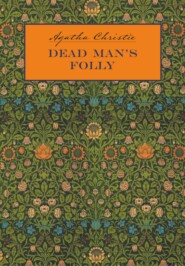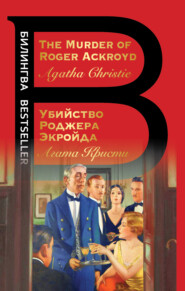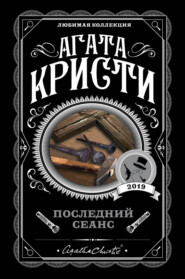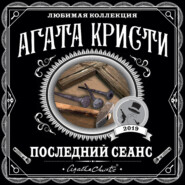По всем вопросам обращайтесь на: info@litportal.ru
(©) 2003-2024.
✖
Ingots of Gold: A Miss Marple Short Story
Автор
Год написания книги
2018
Настройки чтения
Размер шрифта
Высота строк
Поля
Agatha Christie
A classic Agatha Christie short story, available individually for the first time as an ebook.Raymond West approaches the Tuesday Night Club after his visit to John Newman, a friend who is searching for the Spanish ship Otranto which was shipwrecked off the coast of Cornwall. When John Newman disappears for days, upon his return he claims that he had been abducted by the thieves who had stripped the Otranto of its gold, and that the local pub landlord had worked with them. Can Miss Marple help the club solve the mystery of the Otranto and its dangerous allure?
INGOTS OF GOLD
A Short Story
by Agatha Christie
Copyright
This short story is entirely a work of fiction. The names, characters and incidents portrayed in it are the work of the author’s imagination. Any resemblance to actual persons, living or dead, events or localities is entirely coincidental.
Published by HarperCollinsPublishers Ltd 1 London Bridge Street London SE1 9GF www.harpercollins.co.uk (http://www.harpercollins.co.uk)
‘Ingots of Gold’ was first published in Royal Magazine, February 1928, and in the USA as ‘The Solving Six and the Golden Grave’ in Detective Story Magazine, 16 June 1928.
This ePub edition published April 2012.
Copyright © 2012 Agatha Christie Ltd.
A catalogue record for this book is available from the British Library
All rights reserved under International and Pan-American Copyright Conventions. By payment of the required fees, you have been granted the nonexclusive, nontransferable right to access and read the text of this e-book on-screen. No part of this text may be reproduced, transmitted, downloaded, decompiled, reverse-engineered, or stored in or introduced into any information storage and retrieval system, in any form or by any means, whether electronic or mechanical, now known or hereinafter invented, without the express written permission of HarperCollins e-books.
EPub Edition © 2012 ISBN: 9780007486625
Version: 2017-04-18
Contents
Cover (#u87a9cc47-68dc-55fb-873b-7158628e865e)
Title Page (#udb52df17-a5d2-5057-a3e3-8b7525439123)
Copyright
Ingots of Gold
About the Publisher (#litres_trial_promo)
Ingots of Gold
‘Ingots of Gold’ was first published in Royal Magazine, February 1928, and in the USA as ‘The Solving Six and the Golden Grave’ in Detective Story Magazine, 16 June 1928.
‘I do not know that the story that I am going to tell you is a fair one,’ said Raymond West, ‘because I can’t give you the solution of it. Yet the facts were so interesting and so curious that I should like to propound it to you as a problem. And perhaps between us we may arrive at some logical conclusion.
‘The date of these happenings was two years ago, when I went down to spend Whitsuntide with a man called John Newman, in Cornwall.’
‘Cornwall?’ said Joyce Lemprière sharply.
‘Yes. Why?’
‘Nothing. Only it’s odd. My story is about a place in Cornwall, too – a little fishing village called Rathole. Don’t tell me yours is the same?’
‘No. My village is called Polperran. It is situated on the west coast of Cornwall; a very wild and rocky spot. I had been introduced a few weeks previously and had found him a most interesting companion. A man of intelligence and independent means, he was possessed of a romantic imagination. As a result of his latest hobby he had taken the lease of Pol House. He was an authority on Elizabethan times, and he described to me in vivid and graphic language the rout of the Spanish Armada. So enthusiastic was he that one could almost imagine that he had been an eyewitness at the scene. Is there anything in reincarnation? I wonder – I very much wonder.’
‘You are so romantic, Raymond dear,’ said Miss Marple, looking benignantly at him.
‘Romantic is the last thing that I am,’ said Raymond West, slightly annoyed. ‘But this fellow Newman was chock-full of it, and he interested me for that reason as a curious survival of the past. It appears that a certain ship belonging to the Armada, and known to contain a vast amount of treasure in the form of gold from the Spanish Main, was wrecked off the coast of Cornwall on the famous and treacherous Serpent Rocks. For some years, so Newman told me, attempts had been made to salve the ship and recover the treasure. I believe such stories are not uncommon, though the number of mythical treasure ships is largely in excess of the genuine ones. A company had been formed, but had gone bankrupt, and Newman had been able to buy the rights of the thing – or whatever you call it – for a mere song. He waxed very enthusiastic about it all. According to him it was merely a question of the latest scientific, up-to-date machinery. The gold was there, and he had no doubt whatever that it could be recovered.
‘It occurred to me as I listened to him how often things happen that way. A rich man such as Newman succeeds almost without effort, and yet in all probability the actual value in money of his find would mean little to him. I must say that his ardour infected me. I saw galleons drifting up the coast, flying before the storm, beaten and broken on the black rocks. The mere word galleon has a romantic sound. The phrase “Spanish Gold” thrills the schoolboy – and the grown-up man also. Moreover, I was working at the time upon a novel, some scenes of which were laid in the sixteenth century, and I saw the prospect of getting valuable local colour from my host.
‘I set off that Friday morning from Paddington in high spirits, and looking forward to my trip. The carriage was empty except for one man, who sat facing me in the opposite corner. He was a tall, soldierly-looking man, and I could not rid myself of the impression that somewhere or other I had seen him before. I cudgelled my brains for some time in vain; but at last I had it. My travelling companion was Inspector Badgworth, and I had run across him when I was doing a series of articles on the Everson disappearance case.
‘I recalled myself to his notice, and we were soon chatting pleasantly enough. When I told him I was going to Polperran he remarked that that was a rum coincidence, because he himself was also bound for that place. I did not like to seem inquisitive, so was careful not to ask him what took him there. Instead, I spoke of my own interest in the place, and mentioned the wrecked Spanish galleon. To my surprise the Inspector seemed to know all about it. “That will be the Juan Fernandez,” he said. “Your friend won’t be the first who has sunk money trying to get money out of her. It is a romantic notion.”
‘“And probably the whole story is a myth,” I said. “No ship was ever wrecked there at all.”
Вы ознакомились с фрагментом книги.
Приобретайте полный текст книги у нашего партнера:
Приобретайте полный текст книги у нашего партнера:

















